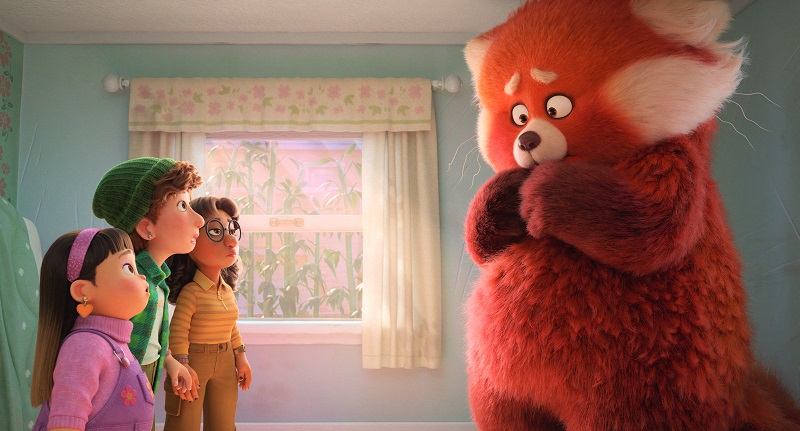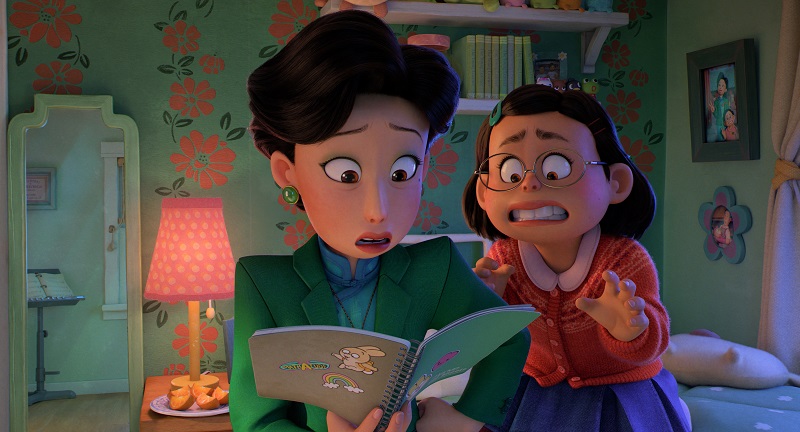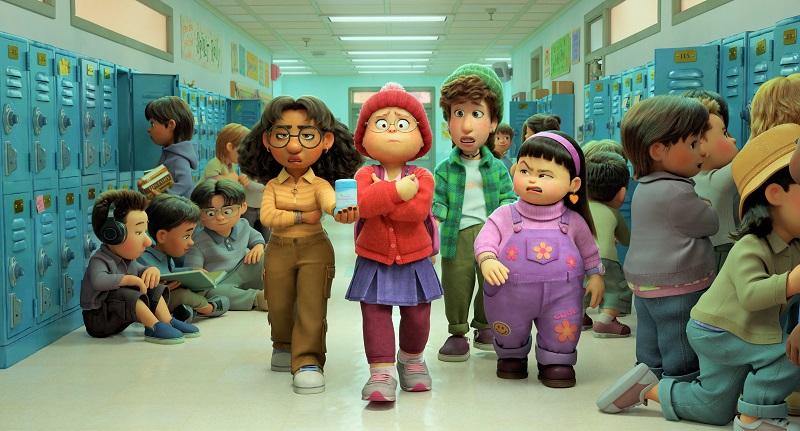Chinese culture is full of traditions that date back many millennia and leave it to Pixar Animation Studios to present one that feels organic, all while simultaneously connecting to today’s audiences. Turning Red is a story about a young Chinese-Canadian woman going through adolescence, figuring out how our familial cultural identity identifies us—and how different it is from the “American” experience—then it also is a slice of pure entertainment from Disney and Pixar whose track record is unmatched.
Rosalie Chiang voices Meilin (called Mei by her family and friends) and does so with such panache. It’s easy to think the Bay Area native was born to be part of this Pixar movie at this particular point in time when a nation is struggling with redefining what it means to be American. Turning Red also works brilliantly simply as a coming-of-age tale
Mei is 13 and she is just commencing her boy crazy years of her life. Of course, she and her friends, Pria (Maitreyi Ramakrishnan), Miriam (Ava Morse), and, Hyein Park’s constant comedy foil Abby are as tight as four friends can be, are heavily into a (of course) boy band named 4 Town and guess who’s coming to town?
Even though Mei is going through some awkward times of her life, with her family’s presence and guidance and her friends, she will be just fine. Except there’s one thing. There is a genetic trait in her DNA that is shared by the female members of the clan. At or around their thirteenth birthday, that innate teenage hysteria—heck, even simple anger—triggers the individual to transform into an enormous red panda. There is a “cure,” but it involves an entire ritual ceremony, exact timing, and a whole lot of luck, or she retains the ability to morph into a red panda.
The thing is, Mei eventually learns to love (and appreciate) her inner red panda. So do her friends! Her (overly) strict mother Ming (Sandra Oh) is the wild card here. How will she react? What will she do? Could she pull Mei out of school? Anything is on the table. Ming is a driven woman who believes her wickedly smart daughter could write her own ticket to university. Mom simply wants her daughter to decide on her future, even if she is merely a sophomore.
Orion Lee voices Jin, Mei’s father, and he is very much his wife’s husband. Yet there’s an earnest moral compass ingrained in him that allows or those wild entities that are known as mistakes. That is much more the case with Jin than Ming. Lee is impeccably cast and is emblematic of the entire Asian ensemble. Asian actors voicing Asian characters … what a concept!
It lends a seemingly obvious authenticity to Turning Red by Sarah Streicher (story by), and the script penned by Julia Cho and Domee Shi, which is utterly delightful. There are little things throughout about growing up Chinese that is as insightful as they are overtly enjoyable. I have always believed that when a film is operating at its best, it should be equally as enlightening as it is entertaining. Cinema has the power to transfer us to different lands, spotlight different peoples (and animals), and does so in such a fashion that it is easy to digest and for our youngest audience members.
It is a priceless learning opportunity
Disney-Pixar’s latest not only possesses a diverse cast, but it is also an outstanding and rich one. Commencing with Chiang, the entire film rests on her shoulders. Turning Red is Mei’s tale and it’s distinctive due to the fact that she isn’t laying waiting around for a prince or some fellow to sweep her off her feet, or at the least educate her in the ways of the world. She figures things out on her own—with a supportive assist from her friends. Even though this is absolutely Chiang’s film, there is a much deeper element at work here.
There are references throughout Turning Red that involve assimilation, living in a multilingual country—despite what those on the right would have you believe—multiculturalism, loyalty to family (something countless cultures share), and one eye firmly on the future. Movies such as this one remind us that we are one people, one world. Our problems are similar. Our struggles are relatable. Films, such as this delightful Pixar journey, remind and reinforce that although we may look and sound different, the struggles are congruent.
Everyone went through puberty. Every single soul on the planet experienced the joy of those six years of teenagerhood. It didn’t worry about where our family originated, and where we live currently matters even less. Leave it to Pixar-Disney to craft a touching, tender, frequently hilarious film that is universal—even if it is about a Chinese family who lives in Canada, and an American viewer being swept away by the magic of the art of cinema.
Grade: A




